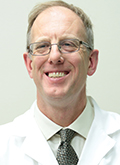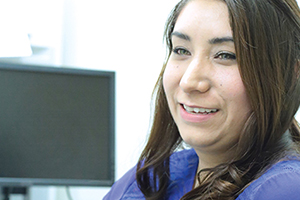By ELLEN FUTTERMAN
To better help the medically underserved, Avera Health recently partnered with a South Dakota-based research program that is working to improve cancer prevention, treatment and cure rates among American Indians in the Northern Plains region.
For more than a decade, the Walking Forward research program has attempted to lower cancer mortality rates among American Indians using patient navigation, clinical trials, palliative care and screening for colorectal, cervical, breast and prostate cancer. Its current focus is smoking cessation, using innovative methods such as mobile technology and personalized text messages.
"Walking Forward was created to address the disparities in cancer care between American Indians and non-American Indians living in the Northern Plains," explained Dr. Daniel Petereit, a radiation oncologist and principal researcher of Walking Forward. "American Indians present with more advanced stages of cancer and therefore experience lower cure rates and higher treatment-related morbidities."

Petereit
Petereit began Walking Forward in 2002 in partnership with Rapid City (South Dakota) Regional Hospital, where he is affiliated, and the National Cancer Institute. Rapid City Regional, located in a city of 70,000, serves a 300,000-square-mile area that incorporates western South Dakota and parts of adjacent states, including the American Indian reservations of Pine Ridge, Cheyenne River and Rosebud. Four of the 10 poorest counties in the United States are located on these reservations.
Since its inception, Walking Forward has enrolled roughly 4,000 American Indians in various clinical studies, which is the highest number of American Indians to take part in clinical trials in the United States, according to the National Cancer Institute. Petereit's research also has led to higher completion rates and patient satisfaction for American Indians undergoing cancer treatment, and suggests that American Indian patients with screen-detectable cancers now are presenting with earlier stages of disease that have higher cure rates.
Closing the gaps
In February, Walking Forward came under the auspices of Avera Health. Avera manages the grant monies and employs the Walking Forward staff. Petereit, while working in collaboration with Avera on this project, continues his practice at Rapid City Regional.
"This partnership allows Walking Forward greater sustainability, a more comprehensive infrastructure to conduct grants and access to Avera's cutting-edge genomic medicine," said Petereit, referring to the molecular and experimental medicine program at Avera's Cancer Institute in the system's home city of Sioux Falls, S.D., which is about 350 miles east of Rapid City. Avera operates about 300 locations, including hospitals, clinics, long-term care facilities and other services in eastern South Dakota, and adjacent regions of Minnesota, Iowa and Nebraska.
Brian Leyland-Jones is vice president of Molecular and Experimental Medicine at Avera Cancer Institute in Sioux Falls, part of the Avera McKennan Hospital and University Health Center. He explained that genomic medicine at Avera uses genetic sequencing to help prescribe the best possible therapies for cancer care, including cancer that has advanced to later stages or is resistant to standard treatment.
"For some patients who qualify, this partnership opens greater possibilities for access to this level of innovative care," he said. "Because disparities exist in outcomes between American Indian and non-American Indian populations, we want to work with Walking Forward to discover what can be done to close those gaps, and help improve health and quality of life for all residents of our region."
Leyland-Jones also noted the partnership with Walking Forward fits perfectly with Avera's mission to "make a positive impact in the lives and health of persons and communities by providing quality services guided by Christian values."
Breaking down barriers
Walking Forward's most recent project focuses on reducing lung cancer deaths in American Indians by getting them to stop smoking. Funded by a four-year, $2.5 million grant through 2016 from the National Cancer Institute, the study has enrolled 217 American Indians living in Rapid City and nearby reservations. The goal is to enroll 256.
At 31 percent, Native Americans have the highest percentage of tobacco dependence compared to 18 percent of U.S. adults overall, according to Centers for Disease Control and Prevention. Smoking among Native Americans in the Northern Plains is even higher, at 44 percent, and the average age of smoking a first cigarette is 13.
Walking Forward designed the "American Indian Health Smoking Dependence Study" to not only understand why this population continues to smoke despite knowing the health risks, but also to identify viable interventions. The study provides cell phones to participants who then receive customized text messages of encouragement as well as pre- and post-cessation counseling and nicotine replacement therapy. Also key: patient navigators.
"Patient navigators have been a pillar of Walking Forward from the beginning," said Petereit, explaining that the program has used two levels of patient navigators — community or lay navigators and cancer navigators.
Community navigators are typically members of the tribes with which they work who serve as a liaison between American Indian patients and the hospital. Cancer navigators are health care professionals, such as registered nurses, who are based at the Rapid City Regional Hospital where they help patients with access-to-care and treatment issues.
Patience and priorities

Simone Bordeaux, a nurse and community navigator for Walking Forward, works with American Indians at the Rosebud reservation in south central South Dakota. She is currently involved in Walking Forward’s smoking cessation study.
"Gaining trust with this population is a big thing — you can't just go in expecting that they will do whatever you say. It takes time to build rapport but I do think my background has helped," said Kristin Cina, who is part Native American and one of three community navigators on the smoking cessation study. She works with the "urban" American Indians living in Rapid City.
Cina, 33, received tobacco specialist training at the Mayo Clinic. She recruits American Indians for the study, meets with them up to 11 times for counseling and to collect data, and provides helpful text messages. While the program is almost at capacity enrollment, she said her biggest frustration has been retention.
"We lose people for all kinds of reasons," said Cina. "Something else came up that day so they couldn't make the appointment. It could be a family member needed a ride someplace or the ride they were expecting didn't come through."
She said she does have some participants who have not smoked for at least six months and knows of a few others who have made it a year.
"The thing about quitting is that it often takes several attempts," she added. "Those who come back to us — you can see how they learned from each experience. Their confidence is higher. Each time they are more committed to staying quit."
Cina, too, is extremely optimistic about the future of Walking Forward especially in light of the partnership with Avera. "I think I can speak for most of the staff when I say we have felt very welcomed and supported since we have come on," she said. "The thing about Walking Forward and the work we do is that it is very fulfilling. We want to remove barriers to cancer prevention, promote early detection, improve cancer cure rates and enhance the quality of life for the American Indian patients we serve."
Copyright © 2015 by the Catholic Health Association
of the United States
For reprint permission, contact Betty Crosby or call (314) 253-3477.